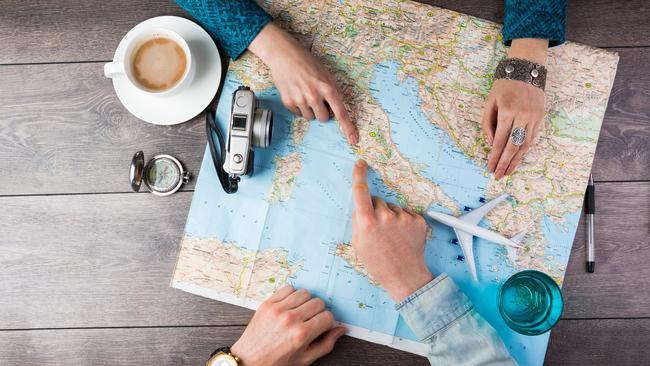Pass the map: Study determines why men are better at directions
Science has already settled the age-old debate over which gender is best at navigating, but now it’s starting to know why.

If you want to spark debate between a man and woman, ask them who is better at reading a map.
Fortunately, thanks to the increasing accuracy of GPS navigation this responsibility is now usually delegated to Siri or Google, with family road trip arguments now focused less on who’s to blame for missing the freeway exit and more on who should be the DJ.
But while scientists have theorised that men’s superior wayfinding abilities were a result of natural selection rather than cultural conditioning, a new study suggests it has more to do with nurture than nature.
Researchers from the University of Illinois Urbana-Champaign analysed data of 21 species including humans from 66 studies to determine the reason why males “generally outperformed females across species” in spatial navigation, even after excluding factors such as home range size.

Justin Rhodes, a researcher involved in the study said the usual hypothesis was that in prehistoric times “men ranged farther than women” which led to their superior navigating skills. “Thus, men with better spatial abilities outperformed men with weaker spatial abilities, whereas there was no such selection in women,” he said. “The hypothesis predicts that sex differences in home range will be correlated with sex differences in spatial navigation across species.”
The research, published in the Royal Society Open Science, showed that differences in wayfinding abilities were not significant between men and women in cultures where both genders had similar ranging behaviour, suggesting societal gender norms were a factor.
The study cited a number of animal and human studies which linked improvements in spatial awareness to an increase in androgens such as testosterone, but ultimately concluded that “sex differences in spatial ability are more likely due to experiential factors and/or unselected biological side effects, rather than functional outcomes of natural selection”.
“...in western cultures where most of the human data comes from, boys and girls might have a different experience with spatial navigation (on average) because of the culture,” he said, for example boys tend to be more encouraged than girls to engage in outdoor activities such as hunting.
“Experience navigating or doing spatial tasks makes you better at them, it doesn’t matter what sex you are.”
Females may not know their way around a map as well as their male counterparts, but statistics consistently show that behind the wheel they are the fairer sex, with women drivers significantly less likely to be involved in motor vehicle accidents.
So when it comes to taking road trips with the opposite sex, the only issue left for debate is ‘who has the better taste in music?’.




To join the conversation, please log in. Don't have an account? Register
Join the conversation, you are commenting as Logout